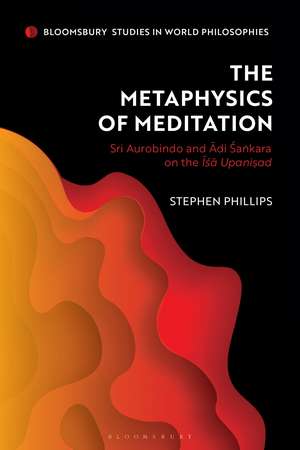The Metaphysics of Meditation: Sri Aurobindo and Adi-Sakara on the Isa Upanisad: Bloomsbury Studies in World Philosophies
Autor Stephen Phillipsen Limba Engleză Hardback – 24 ian 2024
Preț: 510.83 lei
Preț vechi: 731.44 lei
-30% Nou
Puncte Express: 766
Preț estimativ în valută:
97.76€ • 101.93$ • 81.25£
97.76€ • 101.93$ • 81.25£
Carte tipărită la comandă
Livrare economică 20 martie-03 aprilie
Preluare comenzi: 021 569.72.76
Specificații
ISBN-13: 9781350412415
ISBN-10: 1350412414
Pagini: 248
Dimensiuni: 156 x 234 mm
Greutate: 0.53 kg
Editura: Bloomsbury Publishing
Colecția Bloomsbury Academic
Seria Bloomsbury Studies in World Philosophies
Locul publicării:London, United Kingdom
ISBN-10: 1350412414
Pagini: 248
Dimensiuni: 156 x 234 mm
Greutate: 0.53 kg
Editura: Bloomsbury Publishing
Colecția Bloomsbury Academic
Seria Bloomsbury Studies in World Philosophies
Locul publicării:London, United Kingdom
Caracteristici
Explores the commentaries on the Isa of two major Indian philosophies side by side, classical philosopher, Sankara, and the 20th-century giant, Aurobindo
Notă biografică
Stephen Phillips is Professor Emeritus of Philosophy and Asian Studies at the University of Texas at Austin, USA.
Cuprins
AcknowledgmentsSanskrit Transliteration and PronunciationIntroduction: Vedanta and Yoga (Vedantic meditation; Upanisads; Sankara and Aurobindo; Sankhya's pradhana vs Vedanta's brahman; the Bhagavad Gita; the Brahma-sutra and Vedantic metaphysics; action and "liberation"; meditation and "knowledge"; modern studies of Vedanta; Aurobindo vs Sankara) 1. Who is Addressed by Adi Sankara, Who by Sri Aurobindo?2. "Blocked Out" by the Lord or "Integrated?" (Isa 1, 2, & 3)3. The Whole in the Part (Isa 4 & 5 & the makgala-vacana)4. Mystical Knowledge of Unity (Isa 6 & 7)5. (K)nots of Metaphysics: The Causal Argument for the "Self-Existent," svayam-bhu (Isa 8)6. Knowledge of Self (atman) and Knowledge of the Occult (Isa 9 through 14)7. A Theistic Way to Self-Discovery (Isa 15 & 16)8. Aspiration and Surrender (Isa 17 & 18)Appendix A: The Isa Upanisad (the two readings and the Sanskrit)Appendix B: Sankara's Commentary on the Isa UpanisadAppendix C: From the Bhagavad Gita Part One: "The Yoga of Meditation" (Gita chapter 6) Part Two: "The Yoga of Action" (Gita chapters 3, 4, & 5)Appendix D: Sankara's Theodicy (from his Brahma-sutra Commentary)Glossary (Sanskrit words; Classical schools, authors, and texts)NotesBibliographyIndex
Recenzii
The Metaphysics of Meditation is a deeply insightful study of Sankara's and Aurobindo's engagement with the Isa Upanisad. With his characteristic textual and analytical rigor, Phillips addresses important issues in metaphysics, philosophy of consciousness, philosophy of meditation, and the interpretation of Vedanta. It will be of great interest to scholars in philosophy, religion, and consciousness studies.
Prevailing scholarship assumes irreconcilable differences in Sankara's and Aurobindo's Vedantic worldviews. Stephen Phillips challenges this through a critical comparison of their commentaries on the Isa Upanisad. He reveals overlooked convergences, and provides novel perspectives on the entanglements of meditation and yogic phenomenology with metaphysics. In the process, Phillips invites readers to bridge the temporal, cultural, and philosophical gaps between two of South Asia's most influential thinkers.
In this remarkable book, Stephen Phillips offers a provocative new study of the Isa Upanisad that is admirably attentive to its literary, philosophical, and spiritual dimensions. More controversially, he claims to find common ground between Sankara and Sri Aurobindo-usually considered to be worlds apart-in their reflections on the metaphysical and meditative teachings in the scripture.
The Metaphysics of Meditation revisits academic clichés nuancing the "vulgata" contrasting Shankara's and Sri Aurobindo's standpoints and emphasizing their convergences on the basis of both an erudite close-reading of their sources and a pragmatic argument: for both philosophers metaphysics and self-knowledge-through-practice, intellectual and yogic knowledge, must be understood as mirroring one another and guaranteeing their respective validity.
Prevailing scholarship assumes irreconcilable differences in Sankara's and Aurobindo's Vedantic worldviews. Stephen Phillips challenges this through a critical comparison of their commentaries on the Isa Upanisad. He reveals overlooked convergences, and provides novel perspectives on the entanglements of meditation and yogic phenomenology with metaphysics. In the process, Phillips invites readers to bridge the temporal, cultural, and philosophical gaps between two of South Asia's most influential thinkers.
In this remarkable book, Stephen Phillips offers a provocative new study of the Isa Upanisad that is admirably attentive to its literary, philosophical, and spiritual dimensions. More controversially, he claims to find common ground between Sankara and Sri Aurobindo-usually considered to be worlds apart-in their reflections on the metaphysical and meditative teachings in the scripture.
The Metaphysics of Meditation revisits academic clichés nuancing the "vulgata" contrasting Shankara's and Sri Aurobindo's standpoints and emphasizing their convergences on the basis of both an erudite close-reading of their sources and a pragmatic argument: for both philosophers metaphysics and self-knowledge-through-practice, intellectual and yogic knowledge, must be understood as mirroring one another and guaranteeing their respective validity.









